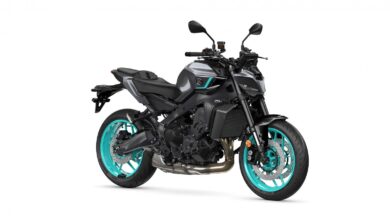A New Ducati: Lock Explains the Key
Ducati Motor Holding SpA (NYSE: DMH and Borsa Italiana SpA: DMH) spent the past month shuffling executives around the globe, most likely responding to a rocky economy, falling U.S. sales and other shortcomings that have been affecting its bottom line. Michael Lock, the new head of the firm’s operations in North America, told Powersports Business he expects the coming year to be filled with new opportunities for the company, its dealers and its customers.
“We’re embarking on what I would call a ‘back to basics’ philosophy,” said Lock, an Englishman who took the position of president and CEO at Ducati North America following the mid-February departure of Joseph Piazza, Jr.
“For all of the best reasons in the world, Ducati moved forward and tried to add levels of sophistication to the business, which is fine. But what we need to do is our basic business first, and so the agenda for the U.S. this year is to do our basic business as well as we can.”
Lock came to the U.S. following a four-month stint as head of Ducati UK, but is no stranger to the North American market. In fact, he joined Ducati after leaving Triumph, where he spent five years and served as the manufacturer’s U.S. chief until early 1997. He worked in product development for Honda in Europe and Japan prior to joining Triumph.
Lock says he believes his time at Triumph prepared him for his new position — “I have an experience with how U.S. dealers work, what the demands are that they have and what feedback they need” — and says his plan is to “accurately communicate back to the factory exactly what the U.S. needs in terms of response times, resources, product development, and so on and so forth.”
In fact, Lock says Ducati is prepared to roll out a new program for the U.S. which, he says, will “radically address” the situation in North America.
“I can’t give you the details on it yet, because it’s not signed off,” he said, “but it’s a radical attempt to influence for the good our performance in the U.S. market while protecting our dealers at the same time.”
Powersports Business wanted to know whether changes in Ducati’s North American operations during 2002 were responsible for the set-backs which have occurred.
“I think the problems arised out of our implementation, rather than from the system itself,” Lock responded. “Outsourcing parts and revamping the computer system was a decision that was made to improve service levels.
“The fact that, in the short term, service levels have gone south is a result of the method of implementation, but not as a result of the intellectual idea of doing it. Once we have ourselves sorted out, the service levels will be better than (customers and dealers) have ever seen.”
Down, But Not Out
Ducati last month posted a near 40% drop in 2002 net profit, a result the company blamed on tighter consumer budgets, a weak dollar and “the restructuring” of its U.S. operations.
Ducati’s Chairman of the Board and new CEO, Federico Minoli, appointed last month when Carlo Di Biagio resigned, recently told Reuters that the immediate outlook is still murky.
He said January and February were “rather grim” because markets “particularly in the U.S. and Germany, did not do well.”
Minoli, mentioning that the global market shrank by about 8 or 9% during the first couple of months of 2003, said real market conditions would not be known until April or May, when riding season formally begins in the northern hemisphere. He said Ducati was braced for a single digit fall in the market, but said a double-digit drop would cause the firm further problems.
Team Building
While Lock’s move to the U.S. may mean a better way of business for Ducati in North America, the biggest shake-up at Ducati corporate actually came on March 6, when Di Biagio announced his resignation and Minoli regained full control.
Di Biagio served as Ducati’s CFO from May 1997 to July 2000, when he was appointed CEO. Minoli was chairman and CEO of Ducati from September 1996 until July 2000, and subsequently remained chairman of the board until regaining the additional post of CEO last month.
Prior to the news about Di Biagio, on Feb. 21, Ducati announced that Mirko Bordiga, 34, was placed as group sales director. Bordiga, who had been head of Ducati Japan since September 1999, began his career at Ducati in 1998 in the firm’s Bologna sales department.
Shinobu Sasaki will become vice president of sales and marketing at Ducati Japan and will continue to report to Bordiga, who will continue in his capacity as president of Ducati Japan.
Finally, Nicola Greco, the previous Group sales and commercial director, has been appointed network development strategy manager of the Ducati Group, reporting directly to CEO Minoli, and Lock’s move paved the way for Piero Guidi to become president of Ducati UK while continuing his role as director of the Italian market.
“I think, in some respects, U.S. dealers feel like they have been left to hang out and dry, and we are right in the middle of correcting that at the moment,” Lock said. “We’re a motorcycle manufacturer, and what we have to do is get back to the simple business of supplying those bikes, publicizing those bikes, servicing those bikes, supplying spare parts for those bikes, and supporting our dealer network. All the other stuff is froth.”
– Guido Ebert




